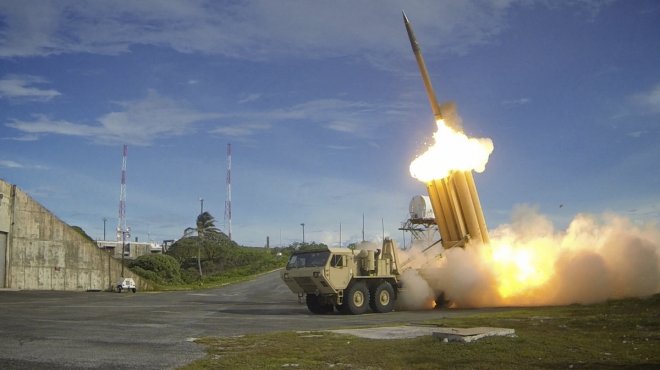
The Pentagon has said it will deploy the THAAD missile defense system in South Korea as quickly as possible, a move that will further deteriorate relations with China.
The Pentagon's reassurance came after the US military commander in South Korea, Gen. Vincent Brooks, suggested the Terminal High Altitude Area Defense was not likely to be deployed in less than eight to 10 months.
"This is something we continue to work closely with the South Korean government. We want to do this as quickly as possible. General Brooks, I know, referenced a time period. We'd like to do it as soon as possible," Pentagon press secretary Peter Cook said, according to Yonhap News.
China believes THAAD will significantly change the military balance in the region and give the US and edge over it.
Cook did not elaborate on the size of the Missile defence shield, whereas Gen. Brooks earlier said it will be "a larger configuration than the one in Guam."
The aerial defence system is of huge strategic importance to South Korea and ally US in the face of the ballistic missile programme North Korea pursues on top if the recent advancements it made in developing nuclear arsenal.
China, which has been criticised by the US for not doing enough to rein in Pyongyang's militarist ambitions, is nervous that US missile defence system in its neighborhood will compromise its security.
The US offered the advanced anti ballistic missile shield to South Korea as a counter balance against the nuclear and missile experiments carried out by reclusive North Korea but China openly said it isn't pleased with the move.
The deployment of the Terminal High Altitude Area Defense (THAAD) on the Korean Peninsula will inevitably prompt a "counter attack", Communist party mouthpiece People's Daily repeated in early October.
The sophisticated system, built by Lockheed Martin Corp along with the associated AN/TPY-2 tracking radar built by Raytheon, can fire anti-ballistic missiles targeting objects inside or outside the Earth's atmosphere.
THAAD, which is designed to intercept and ballistic missiles in their terminal phase, critically improves South Korea's defence against a possible attack by Pyongyang.
Talks between the US and South Korea over the deployment of THAAD were kick-started in February this year following Pyongyang's aggressive military posturing and the nuclear and ballistic missile tests it carried out.
Though the US and South Korea says THAAD's role is to destroy short, medium, and intermediate-range missiles that Pyongyang may fire in the event of a military escalation, China is wary of the missile shield's highly advanced radar and surveillance capabilities.
The US and South Korea will "pay the price" for the deployment of the THAAD, which China believes will compromise its security, the daily warned.
"Like any other country, China can neither be vague nor indifferent on security matters that affect its core interests," the newspaper's foreign policy commentary read.









